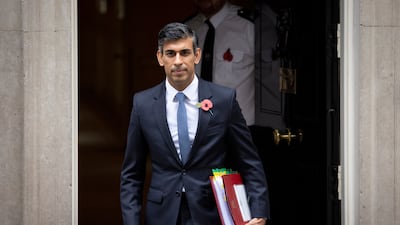Prime Minister Rishi Sunak has torn up his predecessor’s plan to move the British embassy in Israel from Tel Aviv to Jerusalem.
A week into his new role, a representative of the Conservative leader said his view on the matter was at odds with Liz Truss and confirmed he would not be proceeding with her proposal.
During a bilateral meeting on the sidelines of the UN General Assembly in New York in September, Ms Truss told Israeli Prime Minister Yair Lapid that she would review the location of the embassy, sparking warnings and criticism from faith leaders and campaigners.
Israel has claimed Jerusalem as its capital but the Palestinians want part of the city for the capital of their future state.
“There are no plans to move the UK embassy in Israel from Tel Aviv,” a UK government representative said.
A representative for Mr Sunak told reporters that Ms Truss's plan had “been looked at” before announcing the prime minister's decision.

The prime minister on Wednesday attended a reception in London to mark the second anniversary of the signing of the Abraham Accords, praising the agreements for strengthening relations between Israel, the UAE, Bahrain and Morocco.
He used his speech there to hail the accords, which he said had “kick-started a new era of relations in trade, tourism, security, and more” in the Middle East. He said the progress made since the historic signing shows “how we can transform peace and stability in the region”.
“The United Kingdom is committed to working with you all to take this initiative from strength to strength because we all know that progress in the Middle East can be a hard road,” he added.
Following his comments, media reports suggested Mr Sunak had reneged on Ms Truss’s pledge to shift the British embassy to Jerusalem. Before No 10 confirmed the reports on Thursday, the Palestinian Mission to the UK welcomed his stance.
“We would like to thank the UK government, opposition parties, faith leaders, activists and members of the public whose efforts have helped keep the UK in line with international law on the matter,” said Husam Zomlot, the Palestinian ambassador to the UK.
“The question about the location of the UK’s embassy should never have been asked in the first place.
“There is much work to be done to create a conducive environment for peace in the Middle East and make amends for the historic injustice caused by the Balfour Declaration, 105 years ago.
“We call on the British government to play an active role, recognise the state of Palestine, affirm the UK’s support for the rights of Palestinian refugees, ban all illegal goods and products from settlements in occupied territories and sanction companies working in and profiting from them.
“The full and equal application of international law is the way forward towards a lasting and just peace.”
The 1917 declaration by the UK’s foreign secretary at the time Lord Balfour was a key victory for the Zionist movement and a seismic step on the road to the creation of the state of Israel in 1948.
During the First World War, it asserted the British government’s support for the establishment of a “national home for the Jewish people” in Palestine.
After Ms Truss reaffirmed her leadership campaign pledge to review the location of the embassy in Israel, Muslim, Jewish and Christian figures came forward to publicly express their disapproval of her plan.
Cardinal Vincent Nichols, the leader of the Catholic Church in England and Wales, said he had “profound concern” about the plan, and said the move “would be seriously damaging to any possibility of lasting peace in the region and to the international reputation of the United Kingdom”.
“Pope Francis and the leaders of churches in the Holy Land have long called for the international Status Quo on Jerusalem to be upheld, in accordance with the relevant UN resolutions. The city must be shared as a common patrimony, never becoming an exclusive monopoly of any party,” he added in a tweet.
The Movement for Reform Judaism said it opposed Ms Truss’s plan and was committed to “two viable states as the only just and realistic solution to the present situation”.
“Consequently, we would caution against the government taking action that might undermine peace in the region,” the group added.
Zara Mohammed, secretary general of the Muslim Council of Britain, wrote to Ms Truss to say she was “alarmed” by her comments. She added that any relocation of the embassy to Jerusalem “does not serve the UK’s interests”.
“If anything, the relocation of the British embassy could result in many destabilising repercussions,” she wrote. “This point is underscored by respected security analysts and academics.”


